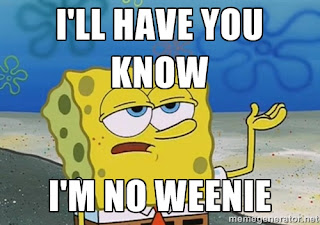I attended a public high school is rural Wisconsin. My graduating class was just shy of 180 students. My AP physics class consisted of 7 students, and my AP calculus class was a mere 5. I was the only girl in each. I rose to the top of my class with minimal effort; I did little work outside of school, I never studied for tests (or even remembered when they were), and still managed to pass with flying colors. Although my laboratory experience consisted solely of lighting bunsen burners and using pH indicators, I assumed college (and grad school) would be just as easy.
Once I got here, however, the fire hose that is MIT showed me just how wrong I was.
In the spring of my freshman year, I began my first UROP. Trying to perform techniques I had never heard of--much less done--before taught me that science is hard. Lab-wide journal clubs and one-on-one meetings with my mentor taught me that reading science is harder. Lab meetings taught me that writing and presenting your own work is hardest of all. Nearly every paper I read felt a mile over my head. I could hardly comprehend what people were saying in meetings--I once dozed off in a meeting with my mentor and PI. All I knew was how to keep my cell cultures alive and measure mouse tumors. The summer after my freshman year, I almost abandoned course 20. I remember thinking: I'm a weenie. Grad school is not for me. I was unable to fathom reading--let alone writing--a scientific paper. The idea of carrying out experiments on my own in grad school was daunting; defending a thesis was unimaginable.
For some reason, however, I decided to stick with it for just one more semester. I continued taking course 20 requirements and doing my UROP in the fall. While I became much more confident in my ability to do science, I still shied* away from reading or presenting scientific literature (I once "nose-goes-ed" a question asked to the lab's 3 UROPs during a lab meeting). I was still convinced that I wasn't cut out for grad school. When my UROP ended with the fall semester, I comforted myself with the knowledge that at least I wouldn't have to read any more of those god-forsaken papers.
*"shied":
Once again, MIT (mostly 20.109) showed me that I was very wrong. But I also also learned that I was very right about some things. I guess you could say I've learned a lot so far. For example:
- You will never not have to read papers. Even if you aren't assigned to read and discuss them. There comes a point when you can't simple google your homework answers (Believe me, there is nothing worse than googling what you think is a "simple" concept that you just didn't understand in lecture and discovering that you have to read a paper to learn more about it). And even when you're not in school any more, chances are you'll still want to know what people in your field are doing (which means reading papers).
- Papers aren't the worst thing in the world. If you you have a strategy, that is. I'm ashamed to admit that the article I presented for journal club was the first paper I've read and really understood. Shame on me for being so hesitant and stubborn. It turns out that if you know how to unpack a paper in the right way, it all seems much less overwhelming. Up until this semester, I sort of assumed that figures were like pictures in a children's book, adding some value but nothing essential. I also thought you could fully comprehend a paper by sitting down and reading it end to end like a book. Spoiler alert: those are horrible ways to go about reading scientific literature.
- Science IS hard. It takes a lot of time (on several occasions over the summer, I spent 15 hours in the lab. We also spend a lot of time in the lab for 20.109, relative to other classes). Things break. A lot. You don't always get the results you were hoping for. Sometimes you don't get any results at all. Such is the life of a scientist.
- Science is also very do-able. Even though it's hard, science is not impossible. And just like scientific articles can be unpackaged and broken down into smaller, more digestible pieces, so can other daunting tasks (like our Mod 1 report, the upcoming Mod 2 report, a presentation, a thesis, or a grant proposal). Having a plan, understanding what you are doing, and taking things bit-by-bit makes science a lot less overwhelming.
- If you google the locations of enough lab supply companies, Thermo Fisher will start advertising on your Facebook newsfeed. ....Need I say more?6. I am not a weenie. Although the idea of grad school still seems daunting, it is now something I could see myself potentially doing. I still have time to make the decision about what I want to do after graduation, but now my options have significantly increased (and so has my confidence in myself as a real scientist!).





No comments:
Post a Comment